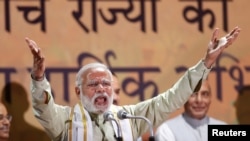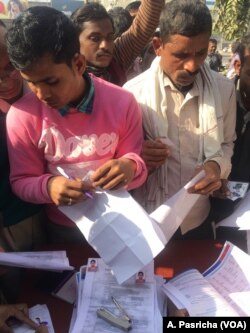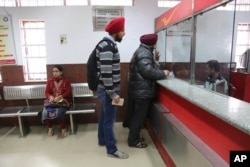After sealing a landslide victory for his Bharatiya Janata Party (BJP) in India’s most populous state, Uttar Pradesh, Prime Minister Narendra Modi has promised to usher in a “New India” by 2022 by enhancing opportunities for poor people.
“I find great potential among the poor. The more poor get the opportunity, the country will progress faster as well," he told jubilant party leaders and workers.
Analysts say Modi rode to electoral success by successfully recasting his image from a pro business leader to a pro poor leader who is working to improve the lot of millions of people whose lives have been untouched by India’s economic success story in recent decades.
In Uttar Pradesh, one of India’s most impoverished states, with a per capita income that is half the national average, his articulation of an “aspirational India” resonated across castes during the campaign which he led.
That helped the Hindu nationalist BJP cut across caste barriers in a state which has traditionally voted along caste and community lines and change the political dynamic in the country, according to Harsh Pant at New Delhi’s Observer Research Foundation and professor of international relations at King’s College in London.
And although opposition parties charged that Modi has failed to deliver on promises of creating more jobs during his three years in power, the elections showed that people see him as the most credible leader.
“They are willing to give him much more time. I think these elections tell us a different story that people are much more patient with him," said Pant. "They are still buying into his narrative of development, buying into his idea of a New India and that they are willing to stand by him.”
The BJP’s tally of 312 out of 403 seats in Uttar Pradesh confounded analysts and Modi critics, who had given grim warnings of a political backlash in the wake of last year’s controversial currency ban that left the country reeling under cash shortages. The forecasts were based on reports of rural distress and job losses.
However millions of voters interpreted the demonetization as a pro-poor measure by Modi and saw him as a crusader against corruption willing to take bold steps to root it out.
The wave of enthusiasm sweeping the BJP supporters after its biggest electoral test since it swept to power in 2014 is not misplaced. Not only has Modi emerged as India’s most popular leader in decades, his party is now in a commanding position ahead of 2019 elections and has moved to occupy the central position in Indian politics – a position held for decades by the Congress Party.
Besides Uttar Pradesh, the BJP is set to form governments in three other states — Uttarakhand where it emerged on top, and in Goa and Manipur, where it fell short of a majority but is sealing alliances with smaller groups. That would put it in power in 15 out of 29 state legislatures.
Businesses hope the victory will spur Modi to push ahead with economic reforms which foreign and domestic investors have long been demanding, but observers say for the time being he is unlikely to implement more controversial ones such as labor reforms.
“I am not seeing any headline grabbing reform which people keep talking about,” said economist Rajiv Kumar at New Delhi’s Center for Policy Research. He said the priority will beon delivery and completion of schemes that Modi started with the focus on generating jobs, specially in poorer regions like Uttar Pradesh.
“UP [Uttar Pradesh] will move with a huge amount of emphasis on improving its infrastructure on improving governance, on improving the agricultural productivity and all of those things, in a sense more of what he has been saying,” says Kumar.
Since his victory, questions have been raised if Modi’s promise to make the poor the cornerstone of his economic vision will prompt him to veer toward a more socialist path. However most political analysts say he is not likely to move away from his vision of a modern India integrated with the world.
Some critics also worry that Modi’s tightening grip on power could embolden hardline Hindu groups and isolate minorities like Muslims but others say that is unlikely to happen. “If at all, if BJP is serious about 2019 and beyond, then I think this victory, if anything, provides Narendra Modi the space to isolate the hardliners,” said Pant.













